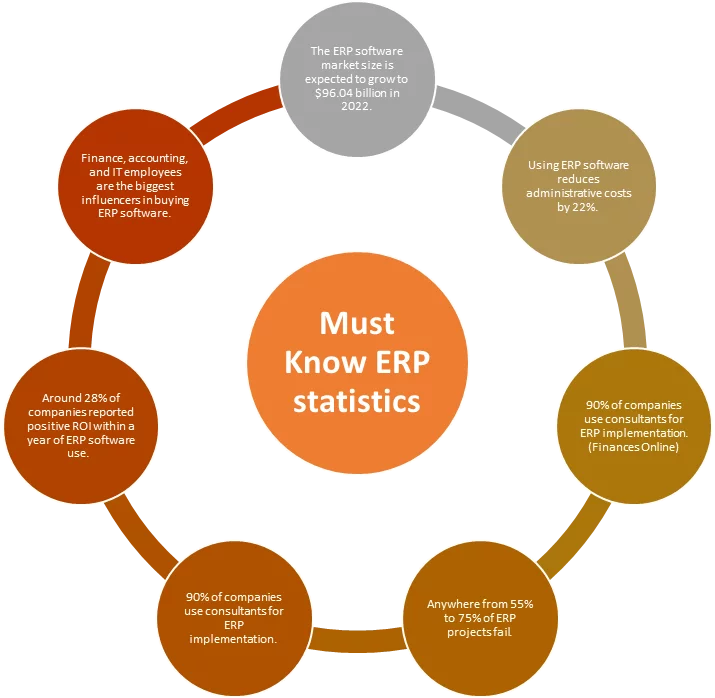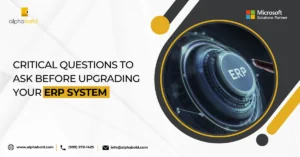Introduction
Companies of every size, vertical, and industry are looking for ways to be more innovative, competitive, and profitable in today’s business landscape. To do so, many companies have turned their attention to Enterprise Resource Management (ERP) solutions. Utilizing ERP for business management has given modern-day companies the flexibility to keep up with the ever-changing demands of the current environment. The extensive adoption of ERP in businesses across the globe exemplifies its enormous significance to successful companies. In fact, according to a study done by Oracle NetSuite, up to 53% of IT executives say ERP is on the list of their investment priorities.
How ERP can Improve Business Efficiency
Enterprise Resource Planning (ERP) software helps organizations manage and automate their core business processes. It is a comprehensive solution that integrates the different functions of an organization, such as finance, accounting, human resources, procurement, and manufacturing, into a single system. ERP systems give organizations more significant insights into their business operations. Moreover, ERP solutions provide companies with 360° visibility into operations, allowing problems to be isolated and resolved quickly. Owing to its robust real-time integration capabilities, ERP systems allow companies to maintain up-to-date financial data, which helps companies have a complete overview of business profitability.
ERP for businesses is the way forward because it is a robust platform that integrates various business functions into a streamlined, unified system that provides real-time data, reporting, automation, and much more across the organization. Furthermore, the system automates previously mundane, daily activities that historically would drain company resources. These activities include: supply chain, procurement, compliance, accounting, project management, and manufacturing. Additionally, the modern-day ERP for businesses supports a company’s planning, predicting, budgeting, reporting, and all other financial aspects. With a single-version-of-truth across the organization, an ERP fosters real-time insights, actionable data, and faster decision-making.
Read more on Understanding ERP: What is ERP and How Does It Work? for more information
How to Improve Business Operations with ERP Business Intelligence
ERP combined with Business Intelligence (BI) offers a potent synergy that can significantly enhance an organization’s efficiency, productivity, and decision-making capabilities. Let’s explore how ERP Business Intelligence can help improve business operations:
- Centralized Data Management: ERP systems consolidate an organization’s data into a single framework. With BI tools integrated, this data can be accessed, analyzed, and reported on seamlessly, ensuring that every decision made is backed by accurate and up-to-date data.
- Real-time Analytics: Modern ERP platforms, when equipped with BI capabilities, provide real-time insights into business operations. This allows for faster decision-making, as managers and executives don’t have to wait for end-of-the-month reports to gauge performance.
- Enhanced Forecasting: BI tools can predict future trends based on historical data. When this predictive analysis is combined with ERP’s comprehensive data, businesses can make more informed projections about market demand, inventory needs, and more.
- Operational Efficiency: ERP BI systems can identify bottlenecks, inefficiencies, or waste in your business processes. By pinpointing these areas, businesses can take corrective action to streamline operations and improve productivity.
- Personalized Dashboards: With BI, users can customize their ERP dashboards to highlight the metrics most relevant to their roles. This ensures that every department, from sales to procurement, gets a clear view of their performance indicators.
- Cost Reduction: With clear visibility into all operational costs, businesses can identify areas where spending can be reduced without compromising on quality or service delivery.
- Enhanced Collaboration: A unified system means that all departments access the same data. This reduces discrepancies and misunderstandings, promoting a more collaborative environment.
- Compliance and Reporting: ERP systems, especially when coupled with BI, can automate many compliance and reporting tasks. This ensures that businesses adhere to industry regulations and standards while also reducing the time and resources spent on manual reporting.
Optimize your Operations with Expert ERP Implementation
Are you ready to boost your business operations through efficient ERP solutions? Allow AlphaBOLD to lead you through a smooth ERP implementation journey tailored to your success.
Request a DemoIntegrating BI with your ERP system can act as a catalyst for improving various aspects of business operations. It not only provides the tools for insightful analysis and reporting but also ensures that the organization remains agile, informed, and ready to adapt to changing business conditions.
Key Functions of ERP systems
By unifying disparate systems into one, ERP solutions aim to enhance efficiency, streamline operations, and provide a holistic view of an organization’s performance. Here are the key functions of ERP systems:
- Financial management: ERP systems provide a centralized location for managing financial transactions and information, such as accounts payable and receivable, general ledger, and reporting.
- Supply chain management: ERP systems can help organizations manage their inventory, production, and logistics processes, including purchase orders, production scheduling, and shipping.
- Human resources management: ERP systems can assist with managing employee information and tracking time and attendance, payroll, and benefits.
- Customer relationship management: ERP systems can help organizations manage customer data, sales, and marketing efforts.
- Project management: ERP systems can help organizations manage projects and tasks and track resources and budgets.

Benefits of ERP in Operations Management
Companies across the globe are looking to implement ERP solutions for improved insights and efficiency across the organization. With massive levels of collaboration and an enormous decrease in operational costs, implementing such solutions helps companies reap the ‘ERP benefit.’The software allows companies to enhance processes, analyze business scenarios, improve employee productivity, and streamline technology investments across departments.
- Improved efficiency: ERP systems automate many manual processes that can slow down organizations, such as data entry and manual reporting.
- Integrated Workflow: One of the primary benefits of ERP in operations management is the integration of various operational processes. With everything centralized, there’s a smooth flow of information from one department to another, eliminating data silos and redundancy.
- Greater accuracy: ERP systems can help to reduce errors by providing a centralized location for data entry and storage.
- Greater visibility: ERP systems provide real-time access to data and analytics, allowing organizations to make data-driven decisions.
- Increased agility: ERP systems can help organizations adapt quickly to market or business environment changes.
- Reduced costs: ERP systems can help organizations reduce costs by automating manual processes and streamlining operations.
The integration of ERP systems into operations management not only streamlines and optimizes business processes but also provides a strategic advantage in a competitive marketplace. The myriad benefits underscore the significance of ERP in enhancing the efficiency, effectiveness, and adaptability of operations management.


Conquer ERP Selection With Our Free Checklist
Conquer ERP Selection With Our Free Checklist! Explore our user guide for comprehensive insights.
Download Guide
Streamlining Core Business Processes
An ERP system integrates various business processes into a single system, allowing for seamless communication and data sharing between departments. This eliminates the need for manual data entry and reduces the likelihood of errors, saving time and resources. Additionally, an ERP system can automate repetitive tasks like invoice processing, freeing employees to focus on more critical tasks, like:
Improving inventory management:
An ERP system’s inventory management module allows organizations to track inventory levels in real time, providing a clear picture of stock levels and helping to prevent stockouts. Additionally, an ERP system can automatically generate purchase orders based on inventory levels, ensuring enough stock is always on hand to meet demand.
Enhancing financial management:
An ERP system’s financial management module allows for automating financial processes, such as invoice processing and financial reporting. This can save time and resources and reduce the likelihood of errors. Additionally, an ERP system can provide detailed financial insights, helping organizations make informed business decisions.
Enhancing supply chain management:
AlphaBOLD has years of ERP implementation experience that helps companies align different processes in one fluid system. Our experts have worked with companies of all sizes and industries to implement tailored ERP solutions successfully. We are fully equipped to deliver advanced ERP and business solutions on agility and scalability. We make sure that our recommendations meet your business needs regardless of your company’s size.
AlphaBOLD’s ERP Software Services
AlphaBOLD has years of ERP implementation experience that helps companies align different processes in one fluid system. Our experts have worked with companies of all sizes and industries to implement tailored ERP solutions successfully. We are fully equipped to deliver advanced ERP and business solutions on agility and scalability. We make sure that our recommendations meet your business needs regardless of your company’s size.

For more information read A Guide to NetSuite Implementation: The Importance of Configuration Sequence
Innovate and Grow with AlphaBOLD's ERP Implementation
AlphaBOLD's ERP implementation services are designed to help you innovate, expand, and reach your operational objectives.
Request a DemoConclusion
In conclusion, an ERP system can help improve business operations. By streamlining business processes, improving inventory management, enhancing financial management, and more, an ERP system can help organizations become more efficient and drive growth. ERP systems can benefit organizations, including improved efficiency, accuracy, and agility. However, implementing an ERP system can be a complex and time-consuming process. Organizations should carefully evaluate their needs and choose a vendor that best fits their requirements. Partnering up with a technology advisor like AlphaBOLD can help companies find the right ERP solution for their business.
AlphaBOLD is a leading ERP implementation expert and a top-tier NetSuite partner with years of experience in implementing ERP solutions for businesses across the globe.
Contact our NetSuite team today for:
- A limited-time free consultation.
- A personalized 14-day trial of NetSuite.
- Detailed pricing and implementation guidelines









